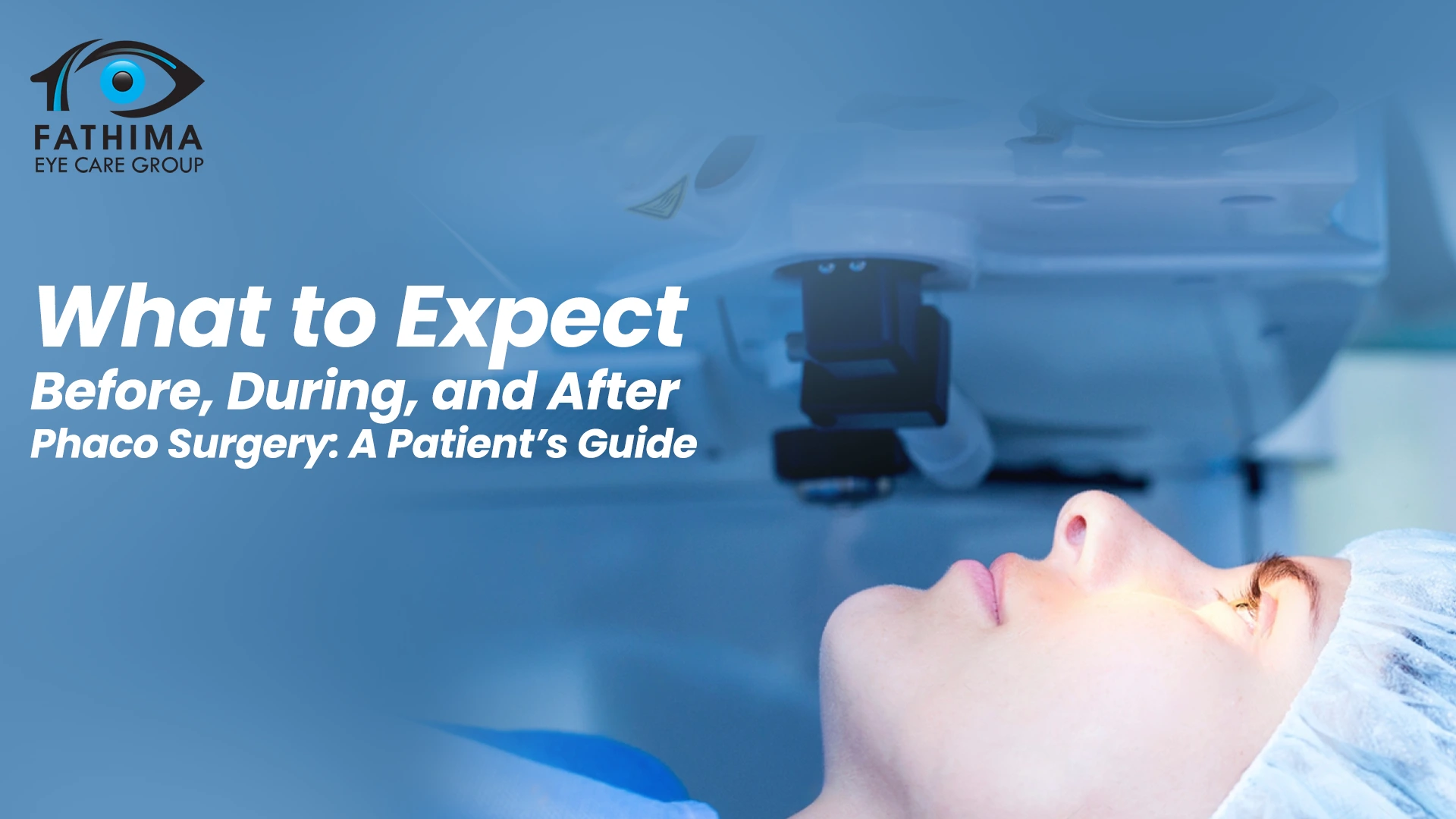

Cataracts have become extremely common in clouding vision and quality of your life. There have been a lot of advancements in the medical world, especially in the field of ophthalmology like the phaco surgery for cataract which has washed away those misconceptions behind cataract making it the most safest, effective and quickest process. It’s quite natural to come up with a lot of questions if you are going to face phaco surgery soon.. Let’s go ahead and explore various things that you would need to know, right from pre-surgery preparations to post- surgery recovery.
What is Phaco Surgery?
It’s the most latest, surgical procedure called Phacoemulsification, commonly known as Phaco Surgery for removing cataracts. This genre of ophthalmic surgery uses ultrasonic energy to effectively break up those cloudy cataract affected lenses with an IOL. This surgical method is renowned for its minimally invasive nature with a quick recovery time making this surgical method a gold standard among worldwide cataract treatment. Understanding various phaco surgery steps can make you much confident and prepared for the procedure you are going to face in the near future.
Pre-Surgery Preparations
A proper preparation is much required before a surgery which is extremely crucial in ensuring the procedure is extremely smooth with a most successful outcome. Let’s go through some steps which can be considered ahead.
Step 1 Comprehensive Eye Examination
The journey would begin with a detailed examination of your eye by a reputed eye specialist. This evaluation can determine,
The severity of your cataract clogging in your eyes.
This examination would also include taking the measurements of your eye, including its corneal curvature and also the axial length which can facilitate the most accurate IOL selection.
It would also assess any underlying conditions, that may include a glaucoma or even a macular degeneration.
Step 2 Selecting the Right Intraocular Lens ( IOL)
One of the most important decisions that you will make here is to decide what type of IOL has to be implanted during the surgery. The most common options among them would include:
Monofocal IOLs: Corrects a single distance vision.
Multifocal IOLs: Provides clear vision at multiple distances.
Toric IOLs: Addresses astigmatism
Accommodative IOLs: Mimics the eye’s natural focusing ability.
Selection of the lens is mostly finalised by your doctor who will decide that on the basis of your visual needs and lifestyle.
Step 3 Medical Clearance and Instructions
If you are suffering from chronic diabetes or even hypertension, your eye specialist may request for a clearance from your primary care physician, which would include some specific instructions like,
Try to avoid certain medications, especially those blood thinners, just for a few days before the surgery.
Use those doctor prescribed antibiotic eye drops to effectively eliminate the risk of any sort of infection.
Arrange a pick-up and drop facility for the day of surgery as it would be tough for you to safely drive for the day.
Step 4 Fasting Guidelines
You can try and avoid eating or drinking for some hours before the surgery. This can really minimize the risk of complications during the surgery.
Step 5 Mental Preparation
It’s better to know what and how your surgery would be like, to reduce the anxiety. It’s always a good practice to discuss even those smallest concerns of yours with a doctor to easily reduce your doubts and thoughts.

Also read : Phaco Surgery for Cataract: Everything You Would Need to Know
The Day of Surgery
If it’s the day of your phaco surgery for cataract, Here are those things that you can look ahead and understand for a battery surgical preparation.
Step 1 Checkin -In and Pre operative preparation
On reaching the surgical center or hospital, you will complete any necessary paperwork and then change your attire to a surgical gown. Then the physician would go ahead and check your vitals like your blood pressure, heart rate etc. Your eyes will be numbed using anesthetic drops which would also include the use of sedatives which will be given for you to relax.
Step 2 The Procedure
It will be a really quick surgery, which would Only last for only around 15 to 30 minutes, where this phaco surgery would include
Creating an Incision
A tiny incision for less than 3mm would be made in the cornea using a fine blade or even laser.
Emulsifying the Cataract
A probe would be inserted through the incision which would emit ultrasonic waves to break the cataract into tiny fragments which would be then sucked out.
Implanting the IOL
An intraocular lens which can be folded will be inserted through the incision which will then unfold and position itself securely inside the lens capsule.
Closing the Incision
It is a self healing incision where only in rare cases a stitch in rare cases would be required. Prescribed antibiotics in the form of drops would be required to prevent the infection. There will be placing of another protective shield over the eyes.
Step 3 – Immediate Post – Surgery Recovery
Just after the procedure, you will be guided to a recovery space where your vitals will be again monitored. There will be an initially blurred where you would even feel a small discomfort or even itching over the operated eye. In most of the cases patients will be discharged within an hour of the surgery.
Post – Surgical Care
Your recovery journey is as important as your surgery. You need to follow your doctor’s advice in taking extreme care to your eyes in ensuring a smooth healing process with some optimal results.

Also read : Phaco Surgery For Cataracts: What are the Risks and Complifications
Immediate Recovery Period
During this time, the most exciting thing that you will experience is the significant improvement to your vision which would take a few more days to fully stabilize. Regarding the discomfort factor, there will be some like a gritty sensation which will subside in a week’s time. Medications would be required to prevent the infection, reduce inflammation and also to lubricate the eye.
Follow-Up Appointments
It’s important to attend all those follow-up appointments to ensure that your eye will heal well. During these visits the doctor who would take care of your eye will effectively check for any signs of infection or inflammation. They will also monitor the position of your newly inserted IOL. This can help in assessing your vision and also keep an eye on the improvement factor.
Activity Restrictions
After the first few weeks of the surgery, you will have to avoid rubbing or pressing over your eye and should also avoid any sort of heavy lifting or even some strenuous activities. Swimming or exposing the eye to dust and pollutants is not recommended during the recovery time. You are requested to wear protective glasses or shield and can use some sunglasses to reduce your sensitivity against light.
Long Term Caring
Overall, phaco surgery patients would always receive great results after the procedure, but there are some cases where posterior capsule opacification or PCO can develop even after some months or later. This is a nothing to worry issue and secondary cataracts can quickly be removed with laser.
FAQ’s
1) Is phaco surgery a painful affair?
Not at all, since it is performed under a local anaesthesia, it’s a 100 % pain-free treatment procedure.
2) How much time will it take to recover from the Phaco Surgery?
Most of the patients would notice a better vision within just a few days and a complete recovery is possible within 4 to 6 weeks of time.
3) Will I have to use glasses again after the surgery?
This would totally depend on the type of IOl that you would choose. Here multifocal and accommodative IOLs would significantly reduce the dependence of glasses here.
4) Will there be any risks that are associated with the phaco surgery?
You need to be aware that, any surgical procedure, will have some risks and here swelling, infection and even complications like retinal detachment in worst cases. As of today the safety record of procedure has a success rate of over 95 %.
5) Will my eyes again have cataracts?
No, cataracts will never come back as your natural eye lenses are removed. PCO can develop, but it’s easily treatable.
Why choose Fathima Eye Hospital for your Phaco Surgery?
Fathima, always gives our priority in ensuring ultimate patient care and surgical excellence. There are some solid reasons why patients prefer us as their most trusted provider of phaco surgery for cataract. They would include,
Seasoned Surgeons : Highly qualified surgeons with ample experience who can handle the worst of the cases to ensure a brighter vision.
State of the art facilities: The use of latest diagnostic and surgical technologies to provide the most precise results.
Personalised Care: Every patient is given a tailored service and this is ensured from pre-surgical procedures to post-surgery follow ups.
Enhanced Support: Guidance is assured at every level of the journey to ensure the much needed comfort and satisfaction.
Let’s conclude with a positive thought about how phaco surgery can be the most simple procedure to enhance your vision and give you a brighter life. If you need the right treatment, make a quick consultation with any of those branches of Fathima Eye Care Hospital to restore that vision you always desired!






